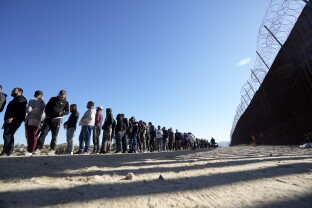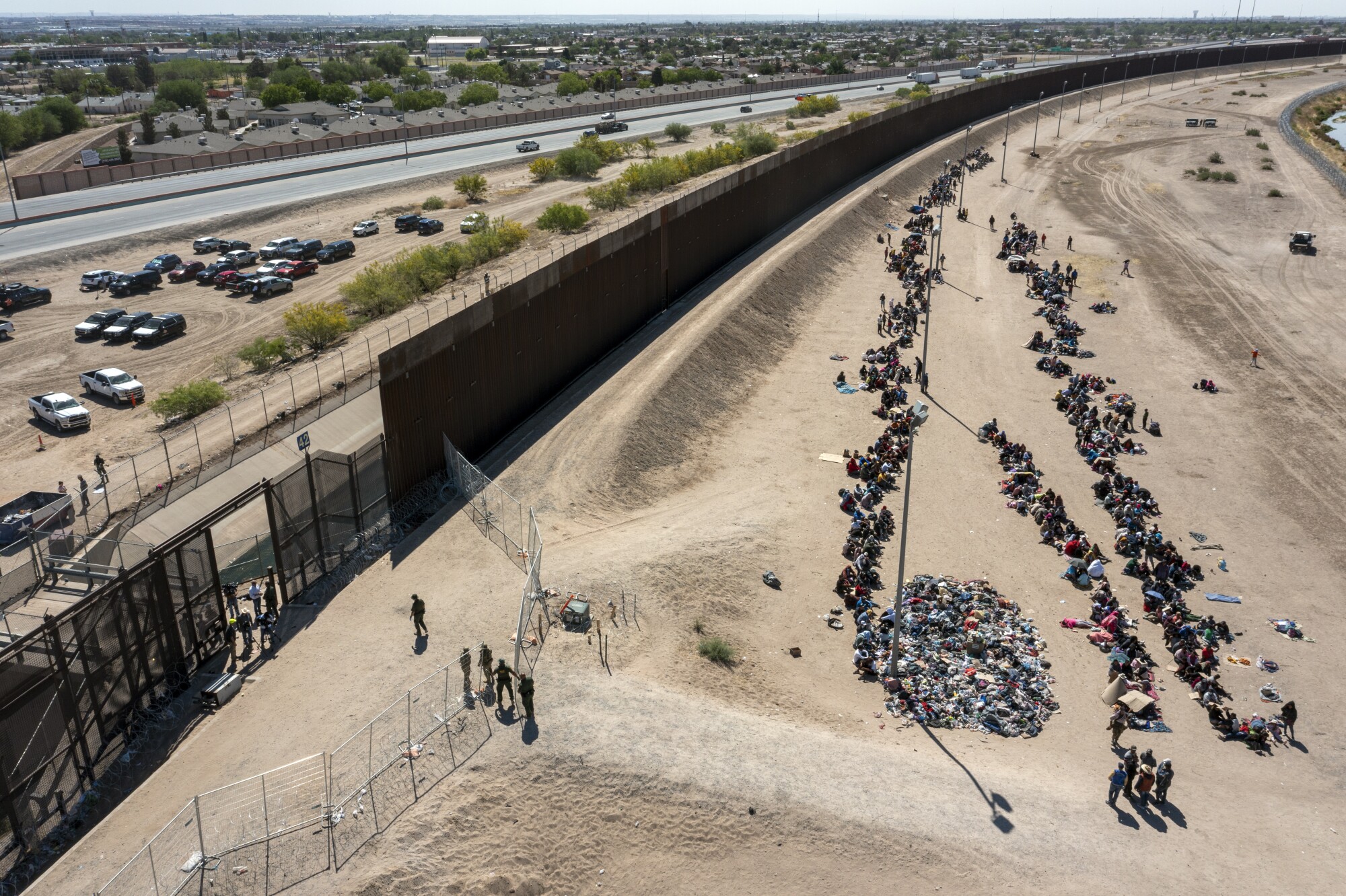Joe Biden is promising to shut down the border. Democratic candidates are condoning rhetoric liberals once deemed dangerously racist. And many of the party’s congressional lawmakers have been supportive of a border security deal considered a total capitulation to the GOP (that the GOP has since rejected as being too soft).
In the span of only a few weeks, the Democratic Party’s immigration agenda has undergone a radical transformation, shifting decisively to the right amid fraught legislative negotiations and campaigns where the issue has emerged as a political liability.
“There’s no question what they were saying when Trump was in office and after Biden got elected was much more pro-immigration, and now it’s just completely 180,” said Silky Shah, executive director of Detention Watch Network, a liberal advocacy group.
In some cases, the party has even adopted conservative policies and rhetoric that it once wholeheartedly rejected, deprioritizing its once-strong support for migrants applying for asylum and accepting congressional legislation that doesn’t give undocumented migrants a legal pathway to citizenship.
The speed and decisiveness of the shift has caught some allies by surprise, even if they consider it an overdue political necessity driven by a yearslong surge of migrants at the U.S.-Mexico border. Other pro-immigration advocates say it amounts to a stunning betrayal.
The Democrats’ transformation comes after they almost uniformly pushed to the left on immigration when then-President Donald Trump regularly assailed immigrants as a threat and pursued policies to bar their entry into the country. At the time, Democrats called many of those provisions cruel and contrary to America’s history as a country built by immigrants, and Biden vowed to reverse many of Trump’s policies after taking office in 2021.
But now, the party, led by Biden, are backing policies with the expressed purpose of bolstering bolder security while making it more difficult for migrants to claim asylum. The bipartisan border deal — which fell apart mere hours after the text was released — didn’t include any pathway to allow current undocumented migrants living in the country a pathway to citizenship.
The legislation was touted by Biden as “the toughest set of reforms to secure the border ever.” Many Democrats have followed the president’s shift in tone: Former Democratic Rep. Tom Suozzi, running for a seat in Congress in a closely contested special election in New York, told reporters this week that he supported the bill. But he went even further rhetorically, declining to criticize his GOP opponent’s description of the surge of migrants at the U.S.-Mexico border as an “invasion.”
“People are concerned people are coming across the border in such a chaotic fashion. I don’t take issue with the language, the description,” Suozzi said on a call with reporters. “It’s a very serious problem of people crossing our border in a very unvetted, chaotic fashion, and it needs to be addressed.”
During Trump’s presidency, Democrats criticized his use of the word “invasion” to describe migrants crossing the border after a gunman in El Paso, Texas, killed 20 people in a Walmart parking lot. Suozzi, following a 2019 trip to the border, said rhetoric from the Trump administration has “exacerbated the problem, permeating a culture of fear that forces many immigrants further into the shadows.”
Suozzi has been criticized relentlessly by Republicans over immigration and the border. A national Democratic strategist, granted anonymity to speak candidly about party strategy, told NOTUS that more of the party’s congressional candidates are expected to take similarly aggressive positions on immigration in future campaigns this year.
Progressive immigration advocates say the messaging around the border is too based in politics and not reality.
“The basic premise that we’ve lost a lot of ground with Democrats on immigration is true and a lot of it is driven by the pollsters,” said Douglas Rivlin, senior communications director for the group America’s Voice. “It’s professional malpractice.”
Party leaders think Democratic House candidates were too passive in defending their record on crime last year, the strategist added, and are vowing not to repeat the same mistake with immigration as the politically sensitive issue continues to gain traction with voters.
On Capitol Hill, Democrats said it’s simply a matter of coming to terms with the severity of the problem.
“If you look at the history of immigration, both parties have failed the American people on this issue,” said Democratic Rep. Don Davis.
“We just want to be honest with ourselves. I mean, there’s an evolving crisis that’s been taking place at the border for some time,” Davis added. “Yes, the numbers are up now. … I’m not going to act as though that is not reality.”
Other Democrats say they’ve never seen immigration politics as resonant with voters as it is today.
“I don’t remember immigration being this big an issue in my career,” said Lanae Erickson, senior vice president for social policy, education and politics at Third Way, a centrist Democratic group.
The shift on immigration started to become evident before the Senate bill saw the light of day.
The Arizona Republic recently reported that Democratic Gov. Katie Hobbs was continuing to bus migrants, a policy of former Gov. Doug Ducey that she had criticized before assuming office. In an interview with ABC15 Arizona, the then-governor-elect said: “It is not providing any real solutions for Arizona or for these migrants. Again, wasting taxpayer dollars and playing politics with people’s lives.” The governor did not respond to a request for comment.
A congressional staffer for an Arizona Republican attributes this policy change to the reality on the ground. While noting that there are plenty of differences between the parties on the border, overall, the number of migrants coming in have forced the two parties to come closer together.
“While Republicans and Democrats seem to be further apart on many of the other issues, (when it comes to the border) they seem to find some common ground,” the staffer said.
The influx of migrants has had all sorts of ramifications, taxing financial and health resources and even led to the closure of some crossings.
“We’ve never ever seen this kind of a constant influx of people, we’ve seen waves, but this wave has been continuous,” Bruce Bracker, a Santa Cruz County supervisor in Arizona, told NOTUS. He also added that the border “is like a double-edged sword,” with trade and commerce flourishing.
When asked how the Biden administration is dealing with the crisis, he said, “He’s done so many amazing things, he’s done a great job on the world stage. … This border crisis has been challenging.”
Still, Bracker does not blame Biden and said the president has done everything he legally can at the border.
Bracker said the Senate’s border bill, which he called “a hell of compromise,” would have provided critical assistance to deal with what’s going on. This includes adjudications at the border and bringing back incentive pay for customs and border patrol officers in small towns.
Bracker acknowledged that the Senate border bill contains measures Democrats would not have agreed to even a couple years ago.
“If you listen to … a couple of (Republican) senators on TV, they’re like, ‘We can’t believe the Democrats are where they are on this.’ That’s because everyone realizes we need to fix it.”
Donald Huish, the registered Republican mayor of the border town of Douglas, Arizona, has also seen this shift among Democrats.
“I see a lot of political change in how we look at and how we solve this situation. … When the numbers are as large as they are, everybody is going, ‘Wait awhile, wait awhile, this is not what I signed up for,’” he told NOTUS.
—
Alex Roarty is a reporter at NOTUS. Tara Kavaler and Tinashe Chingarande are NOTUS reporters and Allbritton Journalism Institute fellows.
Sign in
Log into your free account with your email. Don’t have one?
Check your email for a one-time code.
We sent a 4-digit code to . Enter the pin to confirm your account.
New code will be available in 1:00
Let’s try this again.
We encountered an error with the passcode sent to . Please reenter your email.



